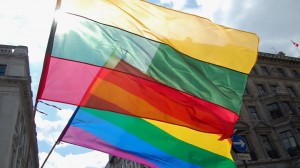
Gay pride events have been repeatedly blocked by Lithuanian officials. There was no street protests against the controversial "protection of minors" law, but in the U.K. Lithuanian immigrants held a march decrying the law. Photo used courtesy of the Tolerant Youth Association.
VILNIUS — Some 93 percent of Lithuanians are unaware of the existence of gay people living in their community, according to a new Eurobarometer survey.
In a testament to how in-the-closet Lithuanian gays are, the statistics show that Lithuanians are the least aware of homosexual people in their families or circle of acquaintances in the European Union. The EU average is 38 percent being aware of gay people in the community.
“A lot of people reject the idea that these people are around,” Henrikas Mickevičius, director of the Human Rights Monitoring Institute in Lithuania told Baltic Reports. “With homosexuals the other thing is that they don’t feel safe and don’t come out. They feel socially unaccepted. Especially in regional areas and small towns, it is risky to come out. Even in some parts of bigger towns it is risky — in short, you can get beaten.”
The head of the pro-LGBT advocacy group Tolerant Youth Association Artūras Rudomanskis told Baltic Reports that widespread homophobia is to blame.
“Many politicians don’t fight homophobia and some even increase it more … there are also some homophobic groups like religious groups and concerned people who are trying to increase homophobia,” Rudomanskis said.
“They are not ready to talk about that — there is no chance to hear about it in schools and there are no lessons about that and if there are some it is homophobic,” he added.
Still an improvement
Despite being the least-aware in the EU, Mickevičius suggested that these numbers signal a triumph for Lithuania in becoming more accepting to gays. Earlier research in 2008 showed that Lithuania is the least tolerant nation towards homosexuality in the EU.
“I would say this [7 percent knowledge of homosexuals in the community] is even progress because if you asked this 10 years ago the figure would be twice lower. There were previously ‘no homosexuals’ in society. People are growing into the understanding that these people are around us and with us and now some of us know about them,” he said.
Rudomanskis said education was a tool that should be utilized to combat homophobia.
“Our country should follow the [EU] law and use it and change the learning structure. It should be human rights orientated in schools. On the political level, we should erase hate speech and homophobia,” Rudomanskis said. “That could give homosexual people the reason to come out.”
However, the implementation of pro-tolerance education seems unlikely. The Lithuanian parliament passed a law this summer banning the promotion of the subject not in schools and anywhere in public where it could be viewed by minors. The law was later condemned by the European Parliament. Lithuanian President Dalia Grybauskaitė also decried the law and set up a panel to amend it to make it less discriminatory. The Lithuanian prime minister’s office said it is open to the panel’s proposals.
Safe topics for discussion
The Eurobarometer study showed that Lithuanians are more aware of ethnic differences and age differences more than other Europeans.
“Lithuanian respondents seem to have more contacts with people of a different ethnic origin or with people with a disability than the European average. However, they are much less likely than the European average to count people who are homosexuals among their circle of friends and acquaintances,” the Eurobarometer research release says.
There is keen understanding in Lithuania about age issues and discrimination, the results show.
“More than half believe that discrimination on the basis of age or disability is frequent in their country, though discrimination due to sexual orientation or gender seems less common,” the report says.
Mickevičius said that discrimination on the basis of age is a real concern, but added that sexual orientation discrimination is less recognized because people are less likely to talk about it. Age-related problems are a safe topic, whereas homosexuality is not, he said.
The Eurobarometer survey data was release on the eve of this year’s summit on equality to be held in Stockholm on Nov. 16-17. The EU-wide survey was conducted in May and June and in Lithuania 1,022 people were surveyed.












